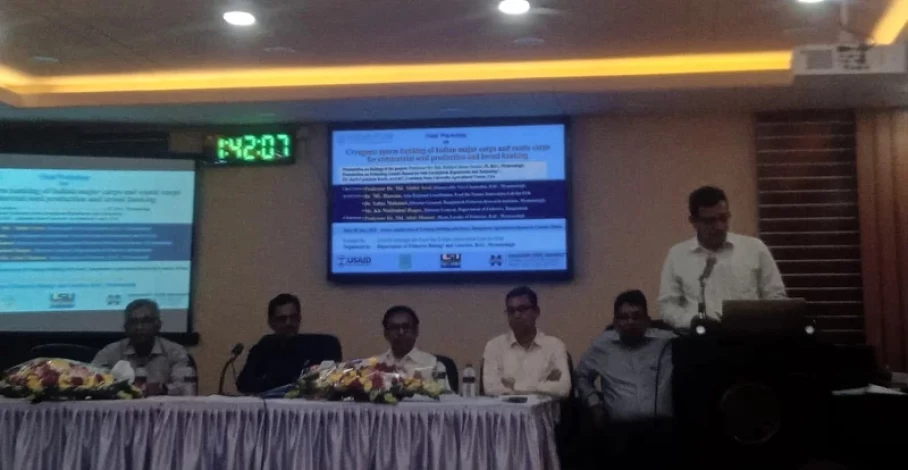
Technology has been developed to preserve the country's fish
sperm for hundreds of years or more. It will be possible to protect the purity
of the fish species and increase production.
Bangladesh Agricultural University (BAU), Department of
Fisheries Biology and Genetics, and Louisiana State University Agriculture
Center Aquatic Germplasm and Genetic Resources Center jointly developed this
technology. The name of this technology is 'cryopreservation'. The researchers
have succeeded in researching these six species of fish - Katla, Rui, Mrigel,
Silver, Bighead, and Grass Carp.
The technology was presented in a workshop at the Bangladesh
Agricultural Research Council (BARC) auditorium in the capital's Farmgate on
Wednesday (July 5, 2023). This technology has been developed under the project
titled 'Cryogenic Sperm Banking of Indian Major Carps and Exotic Carps for
Commercial Seed Production and Brood Banking'. It was funded by USAID and Feed
the Future Innovation Lab for Fish. Department of Fisheries also cooperated in
this.
Under the leadership of Professor Mohammad Rafiqul Islam
Sardar of BAU, Fisheries Biology and Genetics Department, Professor Mohammad
Matiur Rahman was the assistant principal researcher of this research and
Professor Maryam was the member. And the suggestion of this research work is a former professor of Bakribi Mohammad Fazlul Awal Molla. Also, Professor Terence
Tisch of the Agriculture Center of Louisiana State University in the United
States.
The researchers said that pure species of Katla, Rui, and
Mrigel from Halda and Padma and Silver, Bighead, and Grass Carp from China were
extracted. Sperm is collected from them. Then with those pure sperm, chicks are
produced in public and private hatcheries in the Mymensingh, Jessore, Faridpur, and
Barisal regions of the country.
Studies have shown that fry produced from this preserved
sperm has higher growth than normal hatchery-produced fry. For example, a
normal hatchery spermatozoon weighs 107 grams, while a preserved spermatozoon
weighs 140 grams.
Conventional hatcheries do not obtain purebred species for
sperm collection. Their broods (male and female fish) are prone to inbreeding
and hybridization. That is why the growth of fish in normal hatcheries is low.
The researchers said that as long as the sperm can be kept
in liquid nitrogen at a temperature of minus 196 degrees Celsius, the sperm
will be fine. Although this technology has been introduced abroad, it is the first
successful application in the country.
Chief researcher Rafiqul Islam Sardar presented the research
paper at the event. He said this technology will play an important role in
increasing fish production and protecting endangered fish species.
It is known that currently there are 103 government and 953
private hatcheries in the country. These hatcheries supply nearly 100% of the
country's demand for chicks. Only 0.32 percent of the seeds come from natural
sources.
Assistant Chief Researcher Mohammad Matiur Rahman said,
although the required demand is met with fry produced in the hatchery, due to
the lack of quality of fry, the desired product is not available in fish
farming in many cases. If it is possible to preserve the purity of the species,
production will increase.
In the speech of the chief guest at the event, Vice
Chancellor of BAU, Mohammad Abdul Awal said that now many fishes do not taste
like before. The parent species is being destroyed by hybridization,
interbreeding. Hopefully, the original species will survive through this
technology.
This research project started in April 2020. Though the
project was supposed to be completed by March 2023, it has been extended till
next August. Some participants in the discussion mentioned taking the responsibility
of the government to preserve the sperm.
Director General of the Fisheries Department Khandaker Mahbubul
Haque said that two fisheries hubs will be established under a project. And 10
centers will be made in the country. There, experimental preservation of sperm
can be undertaken.
Director General of Bangladesh Fisheries Research Institute
Yahia Mahmud said this project needs to be carried out further. If this
technology does not go to the field, then the farmers and the government will
not get the results. In this case, if the Department of Fisheries and Fisheries
Research Institute is involved, it will go to the field level quickly.
BAU Fisheries Faculty Dean Mohammad Abul Mansoor gave
the President's speech on the occasion. Professor Jack Koch of Louisiana State
University Agriculture Center, Asia coordinator of Feed the Future Innovation
Lab for Fish GM Hossain, and others also spoke at this time. Professor Maryam
presided over the program.
Source:
Online/GFMM
Comment Now